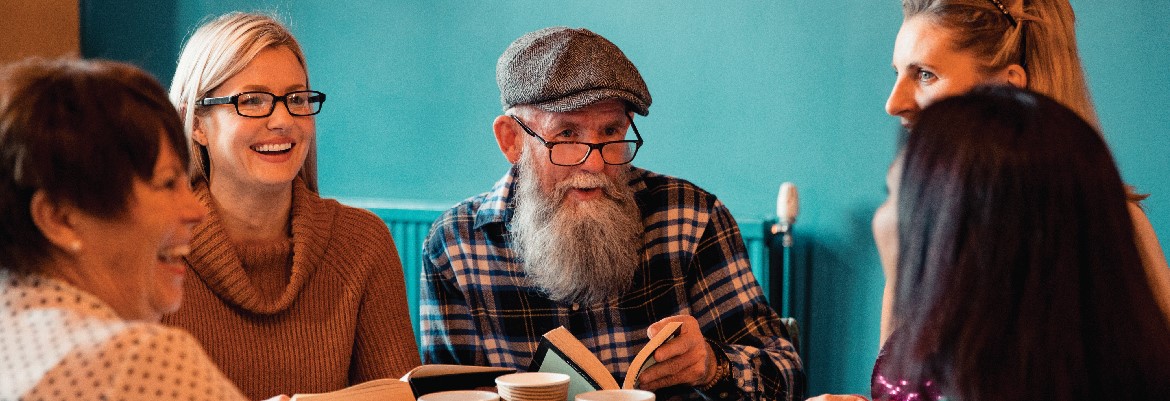CMF Reading Groups
I have benefitted enormously by being part of a CMF reading group for over three years now. It has been a wonderful opportunity to engage with some of the big issues that concern us as Christians in healthcare. You get to dig deeper into particular topics by reading a whole book as opposed to just a short article or talk. You can then regularly discuss these issues with other people, bounce ideas off each other, be challenged by something you hadn’t thought of, or even just clarify your own thoughts through the process of expressing them out loud.
Why?
Christians have a radically different worldview to the prevailing culture that surrounds us; we are in the world but not of it. 1 Sometimes communicating with the secular world, both understanding it and making ourselves understood by it, can feel like building a bridge between two different lands. All good bridges need firm foundations on both sides to work effectively. This is the point of a reading group: to build those foundations, to search for Christian perspectives on tricky issues and to better understand secular culture.
What?
In our groups, we choose a topic or theme and then decide on two books to read; one that comes from a biblical, Christian perspective and another that reflects the attitudes and values of contemporary secular culture. Everybody reads both books before the reading group and then during the meeting itself we discuss it, asking each other questions about our reactions to, and contrasting understanding of both books.
At the end of each meeting, we agree the next theme, books and the date on which we will meet.
Choosing the books can be hard – we try to avoid obscure books that will be hard to find, books that are too lengthy, or ones that no-one has checked (to make sure they are challenging and relevant). Some book pairs might not tackle exactly the same issue, but might offer contrasting worldviews on wider issues.
We try to choose topics that are relevant to us both as health professionals and Christians. CMF book reviews are useful ways of finding relevant Christian books (see page 20). On that point, we sometimes use CMF articles and blogs (cmfblog.org.uk) rather than a book to explore the Christian perspective on a topic.
Where?
The real value of reading groups is in their communal nature. It’s not just about learning but doing so in community with other believers and edifying one another. Therefore, meeting around a meal, be it breakfast, brunch, lunch or dinner is a great way of building relationships.
For the same reason, meeting in a home works particularly well. Welcoming somebody into a home with a plate of food before any discussion begins is a great way of helping members feel included and valued. So, as well as fostering intellectual growth, reading groups can be great opportunities to practice Christian hospitality and community.
When?
This is going to vary from one group to another. My group meets every 3-4 months on Saturday afternoons, as people are less regularly available on weekday evenings and tend to go to church at different times on Sunday. It also allows people plenty of time to travel.
Usually starting with a light lunch around 12:30, we sit down to talk from about 13:00 and close with prayer around 16:00-16:30. While that may sound too long for a meeting, it does allow plenty of unrushed time for discussion. With a good topic and good books to discuss, we often feel like we could go on for much longer!
I act as administrator for my group, which mostly involves keeping people informed about the next meeting and letting the hosts know about numbers for catering and seating purposes.
Worth?
I thought it would be worth letting you hear from other members of my reading group, on what they feel the value of the group has been for them:
‘As Christians in healthcare we must be well-versed in both the secular and sacred thinking of our time. [We need to understand] the way these ideas have been shaped by past thinkers from a variety of Christian traditions… The onus is on us to make these links so we can build bridges and talk confidently about how our perspectives stand in comparison to other worldviews. Spending time together with others who share these interests has been a real blessing to me.’
‘It’s been enlightening to delve into difficult bioethical issues and to compare Christian and non-Christian approaches… I’ve engaged with several important works which I just wouldn’t have done had it not been for this group. Sometimes it is only through reading different viewpoints alongside each other that you can fully understand the distinctions, and this has been very helpful in deepening my understanding of important biblical principles.’
‘It’s been refreshing to discuss some quite weighty ideas in a relaxed and positive setting, with people who bring a range of experiences. I think the discussion has been just as helpful as reading the books themselves.’
Daniel Porter is a final year medical student in London








